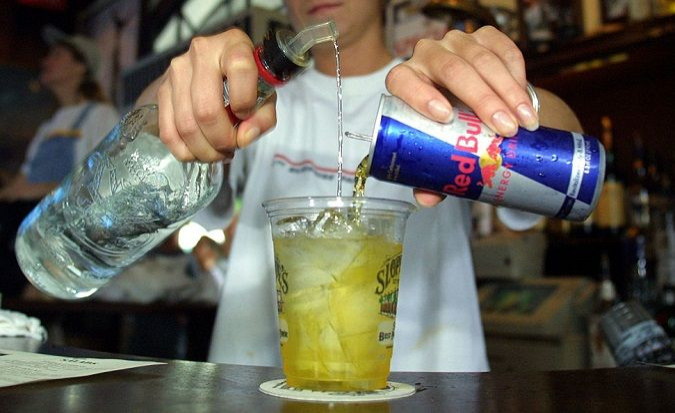Alcohol Plus Energy Drinks Acts Like Cocaine In The Adolescent Brain

Public health agencies around the world have spoken out about the dangers of energy drinks and alcohol on human brains, especially underdeveloped brains. Now, a new study published in PLOS ONE has shown that mixing the two can alter adolescent minds, and cause young mice to show the same kinds of addictive behaviors as if they'd been given hard drugs.
When researchers administered high levels of caffeine mixed with alcohol to adolescent mice, they showed physical and neurochemical signs similar to mice that had ingested cocaine, according to a press release.
"It seems the two substances together push them over a limit that causes changes in their behavior and changes the neurochemistry in their brains," researcher Richard van Rijn said in the press release from Purdue University. "We're clearly seeing effects of the combined drinks that we would not see if drinking one or the other."
Testing the effects of alcohol on human adolescents is illegal, so researchers examined the reactions of mice. The team exposed them to caffeinated alcohol during adolescence and wanted to see if these mice would later consume higher amounts of an artificial sweetener called saccharine. According to Purdue, this substance is similarly pleasurable.
The results of this study reflect what researchers expected — adolescent mice exposed to caffeine and alcohol drank significantly more saccharine than those only exposed to water and they also became significantly more active. This suggests that the exposed mice experienced a chemical change in the brain, authors noted.
"Mice that had been exposed to alcohol and caffeine were somewhat numb to the rewarding effects of cocaine as adults," van Rijn said. "Mice that were exposed to highly caffeinated alcoholic drinks later found cocaine wasn't as pleasurable. They may then use more cocaine to get the same effect."
Moving forward, Van Rijn plans to study the reactions of adolescent brains to legal, but potentially harmful, psychostimulatory substances, such as ethylphenidate.
Source: Robins MT, DeFriel JN, van Rijn RM. Adolescent Intake Of Caffeinated Energy Drinks Does Not Affect Adult Alcohol Consumption In C57BL/6 And BALB/c Mice. PLOS ONE. 2016.
Read more:
Energy Drinks And Your Heart: All That Caffeine Can Alter Heart Rhythm, Increase Blood Pressure
Published by Medicaldaily.com



























